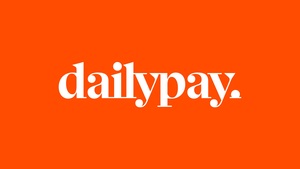NEW YORK, Jan. 5, 2021 /PRNewswire/ -- DailyPay enters 2021 as the recognized gold standard on-demand pay provider (also known as earned wage access or "EWA"), with the best business model in the industry for both employees and employers. DailyPay has pioneered and championed its award-winning employer-based, non-recourse approach favored by America's most forward-thinking blue-chip companies. The DailyPay program is uniquely consistent and compliant in all 50 states, which is especially important for enterprise organizations operating across state lines.
On-demand pay shifted from a "nice to have" benefit to an essential one in 2020. Over one-third of employed Americans (36%) are currently relying on their employer for financial assistance programs (Harris Poll). As such, on-demand pay has exploded in adoption, rapidly becoming the way Americans prefer to get paid. In fact, a recent study showed one in six job seekers are looking for an employer that offers on-demand pay.
As the on-demand pay industry continues to evolve and expand, federal regulatory guidance from the Consumer Financial Protection Bureau (CFPB) has emerged. And this is great news for DailyPay, whose approach to the market, an employer-based, low-cost, non-recourse platform, has been validated by the CFPB. It's bad news for those in the industry whose model includes employee account debiting, and it includes a variety of considerations, concerns and restrictions impacting vendors of wage deduction programs and their employer clients.
On December 30, 2020, the CFPB issued a follow-up order in response to its November 30, 2020 advisory opinion, which provides guidance on certain EWA programs.
Three important takeaways from the December CFPB EWA order include the following:
- Utilizing debiting as a form of EWA payback may be considered an extension of credit and is excluded from the CFPB order's safe harbor. Debiting consumer bank accounts continues to be a dangerous and strongly disfavored practice, both by the CFPB and other state authorities, and debiting is a common practice in "credit transactions."
- Wage deductions continue to be illegal in many states and employers using a wage-deduction model have to contend with additional compliance obligations and restrictions, including employer auditing, reporting, manual payroll deduction processes, and other obligations for deduction programs in the opinion and order.
- Safe harbor determinations do not protect vendors and employers equally. For example, the safe harbor in the December 30 order gives a vendor credit safe harbor coverage, but does not provide employers any safe harbor against state wage and hour wage deduction restrictions, and may specifically burden employers working with certain vendors.
"From day one, DailyPay has intentionally never required any form of employee payback, debiting or payroll deduction that would implicate the extension of credit," said Jason Lee, CEO and co-founder, DailyPay. "The primary aim of an on-demand pay program should be to enhance the financial stability of employees. Debiting puts employees at risk for surprise overdraft fees or insufficient funds charges, which runs counter to this mission. Further, wage deductions for EWA continue to be prohibited at the state level in many states. We are pleased to see that the CFPB has not endorsed these practices as a means of repayment, and look forward to continuing to provide hard-working Americans with their already earned pay in a consistent, compliant manner."
DailyPay has never required any form of employee payback, debiting or wage deduction that would implicate the extension of credit. The November CFPB opinion and the December CFPB EWA Approval Order were narrow issuances of guidance, to provide clarity around which practices of other providers are problematic. Particularly, the December order indicates that wage deduction programs still face restrictions and prohibitions under state wage and hour laws. The safe harbor under the December order does not resolve this key risk. Providers with wage deduction methods can expose their partner employers to this and other legal risks, and are not covered for these risks under the November opinion or the December order. Furthermore, employers relying on wage deduction-based programs must now contend with additional restrictions and concerns regarding this practice.
DailyPay has created an ecosystem with the most advanced, modern technology stack in the industry, and delivers the most secure, compliant, seamless and employer and employee-friendly, on-demand pay benefit in the rapidly growing marketplace.
"Companies and organizations who choose a non-compliant vendor risk violating state wage and hour and Department of Labor rules, tax law, other regulatory violations and expose themselves to potential danger for employee-led legal action, including class actions," said Matthew Kopko, Vice President, Public Policy, DailyPay. "As we continue to watch regulation in this industry unfold, we expect only the highest quality standards to be upheld."
About DailyPay:
DailyPay is the award-winning, recognized gold standard on-demand pay platform offering comprehensive pay experience solutions to world-class companies and their millions of employees, including Adecco and Berkshire Hathaway. DailyPay has created an ecosystem with the most advanced, modern technology stack in the industry and delivers the most secure, compliant and seamless on-demand pay benefit in the rapidly growing marketplace. DailyPay is headquartered in New York City with operations based in Minneapolis. For more information, visit www.dailypay.com/press.
Contact: Sehrish Sayani
Email: [email protected]
Website: dailypay.com
SOURCE DailyPay

Related Links
WANT YOUR COMPANY'S NEWS FEATURED ON PRNEWSWIRE.COM?
Newsrooms &
Influencers
Digital Media
Outlets
Journalists
Opted In





Share this article